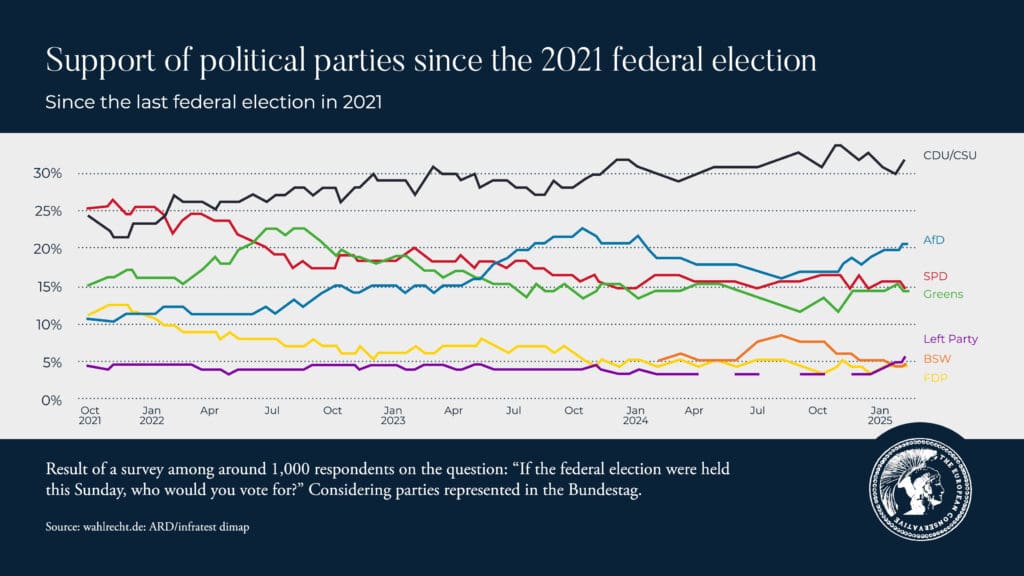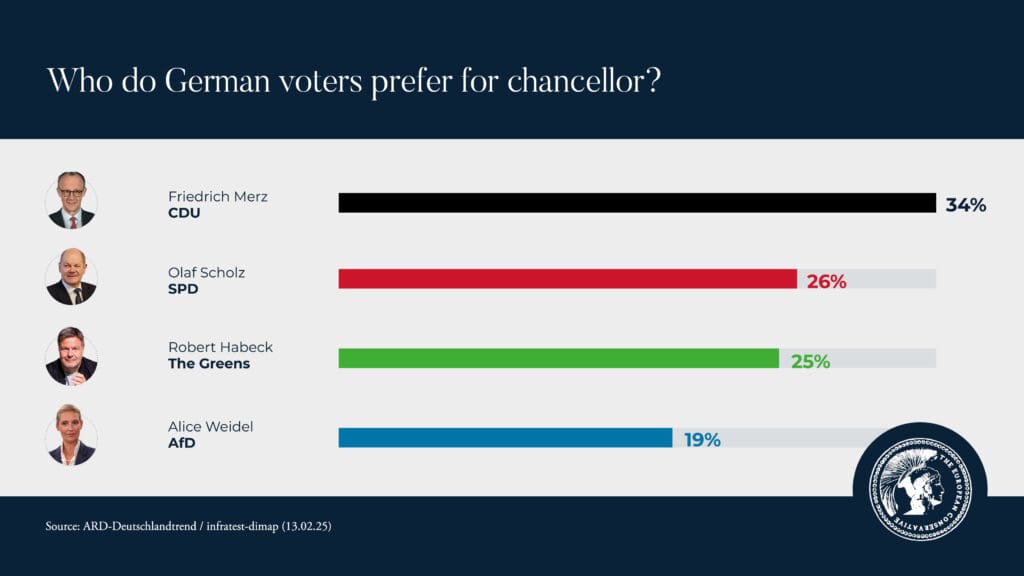
Friedrich Merz and Alice Weidel shake hands prior to the start of a television debate in Berlin on February 16, 2025, ahead of the parliamentary elections due to take place on February 23, 2025.
Kay Nietfeld / POOL / AFP
Germany is preparing for the general elections this Sunday, February 23, with the possible consolidation of Alternative for Germany (AfD) as the country’s second-largest force in a surge that challenges the traditional political balance. It deeply worries the socialist-conservative establishment within Germany—and at the European level.
Polls indicate a tight race between Friedrich Merz’s CDU, leading with 30% of the vote, and AfD, firmly positioned at 21%, solidifying its role as the main opposition force against the traditional bloc. Meanwhile, Olaf Scholz’s Social Democratic Party (SPD) is registering its worst historical result at 16%, followed by the Greens (14%) and The Left (8%). The liberals of the FDP and the new party BSW are hovering around the 5% threshold for entering the Bundestag.

The rise of sovereigntist and anti-immigration AfD reflects a shift in voter perception, as more Germans see the party as an alternative to the progressive policies that have dominated the last decade and led Europe’s former economic powerhouse into an unprecedented economic crisis. Despite attempts by the political elite to isolate the party, AfD, led by Alice Weidel, has achieved steady growth, particularly in the eastern part of the country, surpassing 30% in some states. Meanwhile, Friedrich Merz has hardened his rhetoric to attract voters discontented with Scholz’s government and curb AfD’s rise. Merz has promised stricter immigration controls, tax cuts, and measures to revive the economy. However, the CDU remains reluctant to form any agreements with AfD, which could complicate governance in a fragmented Bundestag. This also raises doubts about the true intent of CDU’s policies, as none of its potential left-wing allies want to restrict immigration or abandon climate policies—quite the opposite.
Germany has entered recession for the second consecutive year, with a 0.1% contraction in the last quarter of 2024, marking a deep crisis in the country’s industrial model. The decline in Chinese demand, along with rising energy costs following the green transition, have severely impacted the productive sector, particularly the automobile industry—one of the country’s economic pillars. Germany is no longer the locomotive of Europe, and unemployment has risen to 6.4%.
On the migration front, the situation is even more tense. Germany received over 300,000 asylum applications in 2024, placing enormous pressure on welfare and security systems. Recent violent attacks by illegal immigrants, such as the one that occurred in Munich earlier this month, have increased public rejection of open-border policies. In response, Merz has advocated for the immediate deportation of illegal immigrants and the reduction of social benefits for new arrivals, measures that AfD also supports but pushes even more aggressively.
The February 23rd elections will determine Germany’s direction and impact Europe’s political balance. If the AfD consolidates as the second-largest party, traditional parties may be forced to modify their policies to contain the seemingly unstoppable rise of patriotic forces—even though the AfD’s leaders are rarely among the top-ranked in primary polls.

The key uncertainty will be government formation: if the CDU fails to secure a majority with AfD, a new ‘grand coalition’ with the SPD could become a possibility—a scenario many voters reject. Otherwise, Germany could face a deadlocked parliament and a period of instability. It remains uncertain how a repeat election might benefit AfD.
With the economic crisis hitting the middle class and mass immigration becoming a pressing issue, Germans must decide whether to continue on the progressive path of recent years or turn toward a more conservative and sovereignist model. Whatever the outcome, these elections will shape the future of Germany and the European Union for years to come.
